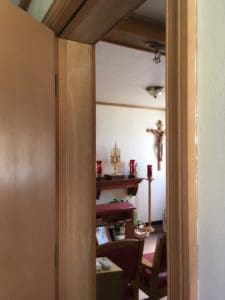Trusting God’s word for wisdom in our daily lives, we share a Franciscan Gospel reflection and questions written by Fr. Paul Gallagher, OFM. They are edited by Franciscan Sister of Christian Charity Sister Anne Marie Lom and Joe Thiel. The excerpts from the Sunday readings are prepared by Joe Thiel. To read or download the complete pdf with excerpts for your prayer, please click here: Franciscan Gospel Reflections September 15 2018. Excerpts from the Lectionary for Mass for Use in the Dioceses of the United States of America, second typical edition © 2001, 1998, 1997, 1986, 1970 Confraternity of Christian Doctrine, Inc., Washington, DC. Used with permission. All rights reserved. No portion of this text may be reproduced by any means without permission in writing from the copyright owner. Please include this information when printing.
Photos: Holy Family, Marinette, Wisconsin and St. Francis of Assisi Convent, Greenwood, Mississippi
Mark 8:27-35
Now Jesus and his disciples set out for the villages of Caesarea Philippi. Along the way he asked his disciples, “Who do people say that I am?” They said in reply, “John the Baptist, others Elijah, still others one of the prophets.”
And he asked them, “But who do you say that I am?” Peter said to him in reply, “You are the Messiah.” Then he warned them not to tell anyone about him. He began to teach them that the Son of Man must suffer greatly and be rejected by the elders, the chief priests, and the scribes, and be killed, and rise after three days. He spoke this openly. Then Peter took him aside and began to rebuke him. At this he turned around and, looking at his disciples, rebuked Peter and said, “Get behind me, Satan. You are thinking not as God does, but as human beings do.”
He summoned the crowd with his disciples and said to them, “Whoever wishes to come after me must deny himself, take up his cross, and follow me. For whoever wishes to save his life will lose it, but whoever loses his life for my sake and that of the gospel will save it.”
Background
This is a turning point in Mark’s gospel. Previous to this, Jesus has traveled from town to town preaching about the Kingdom of God and healing. After this, he will continue to preach and heal, but his journey will be toward Jerusalem. As Jesus moves toward Jerusalem he will speak three times to his disciples of his impending rejection, suffering, and death. Each time he speaks to them of what awaits him in Jerusalem, he will also instruct them on what it means to be his follower.
In Jesus’ day there was no consistent understanding of what the Messiah would be like. Some expected a political leader, others a respected teacher, yet others a great prophet. Likewise, even the crowds to whom Jesus preached did not seem to have a clear understanding of who he was. However, all three responses to his question–John the Baptist, Elijah, or one of the prophets–would indicate that many believed he was a significant religious person who had come back from the dead. One might also wonder if the responses of the disciples reflected their own understanding of who they believed Jesus was as well as the view of the crowds. It is fair to say that even the disciples of Jesus had not come to a consistent understanding of who he was, even if Peter, who spoke for all of them, could say that he Jesus was “the Messiah.” The kind of suffering servant that Jesus indicates in verse 30 is far from even Peter’s understanding.
The culture of Jesus’ day is very unfamiliar to most of us. In our culture one is expected to strive to be independent and self-sufficient. When someone is perceived as conforming to the desires or values of others, their behavior is often seen as giving in to peer pressure or family pressure. Other cultures hold the opinions of family and community in greater esteem than one’s own. Jesus lived in a culture where one’s relationship to family was the center of life and identity. In the gospels, Jesus is spoken of as the son of Mary, or even the carpenter’s son. Peter is the son of Jonah, and James and John are the sons of Zebedee. While Jesus had rejected the trade of his father, he was still a person of his culture. It was important to him to find his own meaning and purpose in and among his disciples. This may explain in some part the harsh response Peter received when he tried to privately express his belief and hope about Jesus, and then objected to Jesus’ talking about soon being rejected and put to death. It may also explain why Jesus tried, on three different occasions, to instruct the disciples about his approaching death. Jesus was still a person of his day. Understanding his role as part of a familial social group could help him to understand himself.
Reflection Questions
1. Have you had experiences where it became apparent to you that a friend or family member did not really know you? Do you recall how that affected your relationship with that person?
2. Has there ever been a time in your life when you knew that you needed to make some hard and difficult choices? Were there people who walked with you through those difficult times, and were there also people who abandoned you in those difficult times?
3. Imagine that you are one of the disciples and you and Jesus have been walking along the road talking, and Jesus turns to you and asks “Who do you say that I am …
4. Imagine you are with the disciples and you hear the conversation between Jesus and Peter. What are some of your thoughts as this short conversation unfolds?
5. What thoughts arise within you as you hear Jesus say, “Whoever wishes to come after me must deny himself, take up his cross, and follow me. For whoever wishes to save his life will lose it, but whoever loses his life for my sake and that of the gospel will save it.”
6. Can you take some time to talk with Jesus about his role as messiah, or about your desire to take up your cross, or perhaps about your own experience of your cross at this point in your life?




